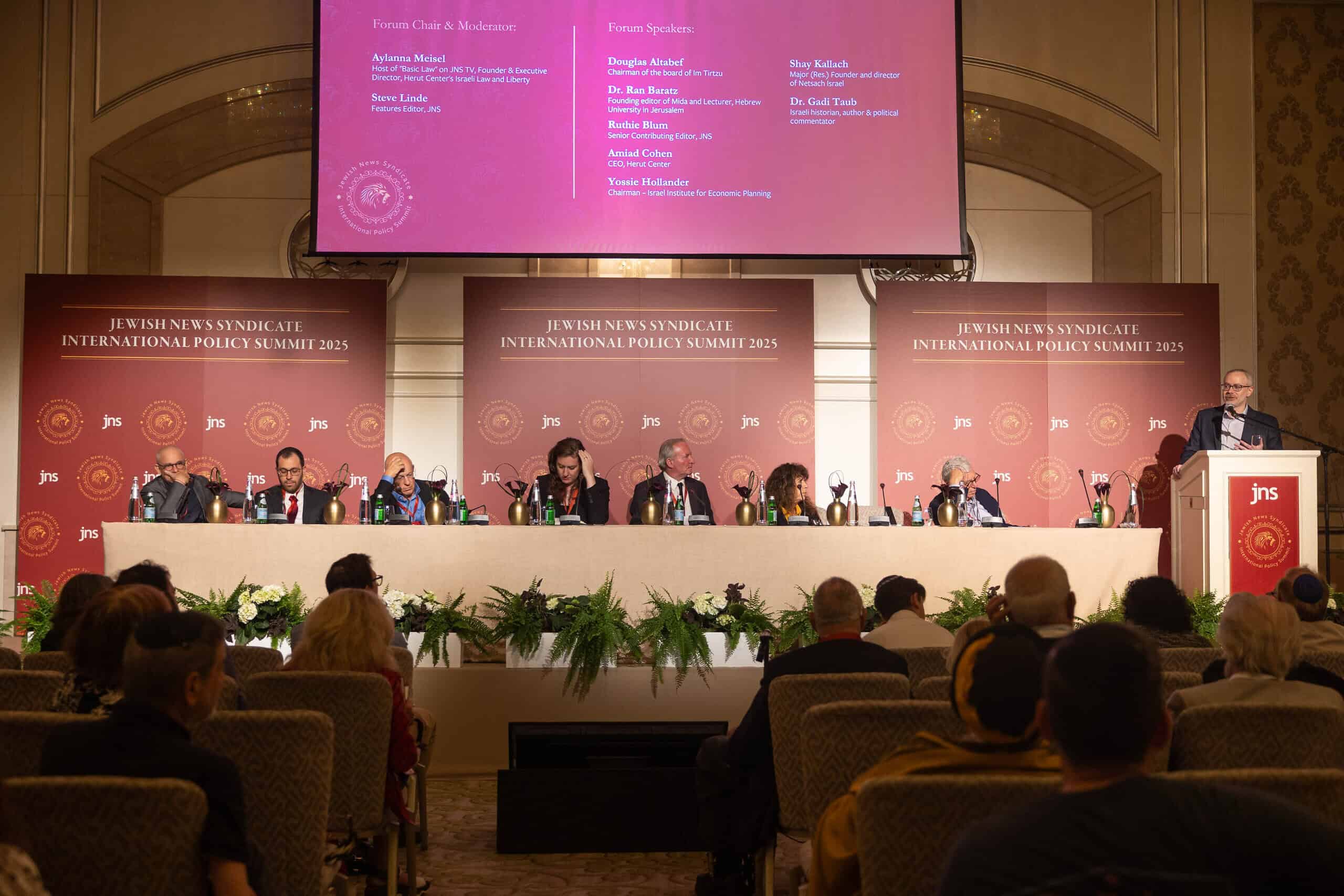by David Isaac
"We live in a sort of anarchy. We pretend we have an executive branch and a parliament."
 |
Anti-judicial reform protesters and activists clash
with Israeli police as they block Begin Road near the Knesset in
Jerusalem on July 24, 2023. Photo by Noam Revkin Fenton/Flash90. |
A distinguished panel of public intellectuals, legal experts and activists painted a grim picture of Israel’s democracy at the inaugural JNS International Policy Summit in Jerusalem on Sunday, warning that power has been wrested from voters by unelected elites.
The panelists predicted an inevitable confrontation between elected officials, representing the majority, and an entrenched elite seeking to maintain control. They pointed to Israel’s Supreme Court as the main driver of what they called a decades-long erosion of democratic governance.
In 1995, the court declared a “constitutional revolution,” despite there being no intention to do so on the part of Israel’s Knesset, which had passed two basic laws in 1992 without any notion of transforming the system.
“Over the past four decades, Israel has transformed from a parliamentary democracy into the world’s foremost juristocracy, with the boldness and speed of judicial imperialism increasing wildly within the past decade,” said Aylana Meisel, host of JNS TV’s “Basic Law.”
Describing this as an “existential challenge to democratic self-governance,” she warned that the court’s supremacy “has removed the capacity for compromise and lessened the responsibility and accountability of lawmakers, displacing the rule of law with the rule of lawyers.”
Ran Baratz, founding editor of the conservative magazine Mida and a lecturer at Hebrew University, pointed out that “Israel was the first democracy to undergo a constitutional revolution without any participation from the people.”
He noted that while bureaucratic and judicial overreach is a problem in many Western democracies, “Israel has gone the furthest, to the extreme of this bureaucratic-judicial coup.”

According to Baratz, the judicial branch has absorbed much of Israel’s bureaucracy, sidelining the legislative and executive branches. Government institutions, once subordinate to the elected executive, now “swear allegiance to the court,” he said—a trend he called a “warning sign” for democracies worldwide.
Baratz went so far as to describe Israel
as a “failed state,” claiming that the separation of powers has
collapsed. “We live in a sort of anarchy. We pretend we have an
executive branch and a parliament,” he said.
He pointed to left-wing
protesters holding up posters of unelected officials—heads of the
Attorney General’s Office, the Israel Security Agency (Shin Bet) and the
Israel Defense Forces—as evidence that real power has shifted away from
elected representatives.
Israeli historian and commentator Gadi Taub echoed Baratz’s concerns. “Israel is not a democracy,” he said. “There is no action by the elected branches that the court cannot overrule. Sovereignty is now in the hands of 15 unelected judges who control judicial appointments.”
IDF Maj. (res.) Shay Kallach, founder of Netsach Israel, said a “tiny minority elite” controls Israel’s foundational institutions, carrying the mindset of a majority, while “the actual majority, ironically and unfortunately, carries the mindset of a minority.”
Kallach traced the roots of Israel’s bureaucratic dominance back to the pre-state period, when early leftist leaders introduced authoritarian tendencies.
However, not all panelists agreed that Israel had lost its democracy.
Yossi Hollander, a software industry
pioneer and chairman of the Israel Institute for Economic Planning, told
the audience, “Israel is a democracy—a democracy with problems, like
any other.”
“If I have to choose Israel’s problems versus, say, France’s, I’d rather have Israel’s,” he said.
Ruthie Blum, senior contributing editor for JNS and a former adviser to Israeli Prime Minister Benjamin Netanyahu, also cautioned against extreme language.
While acknowledging the Supreme Court’s outsized influence, Blum warned that calling Israel “anti-democratic” plays into the hands of the country’s enemies abroad.
“The Supreme Court isn’t democratic—not Israel as a whole,” she said, adding that left-wing protesters have similarly accused Netanyahu of “destroying Israeli democracy.”
Despite the panel’s bleak diagnosis, several speakers expressed optimism about Israel’s future, noting that those aligned with unelected powers are aging and increasingly out of touch with the public.
‘This is the heart of Zionism’
Doug Altabef, chairman of the board of Im Tirtzu, placed his faith in Israel’s citizens. “Despite the political divisions, there is a surprising consensus underneath,” he said.
“The hysteria in left-wing discourse—claims of a coup, the end of democracy, calls for civil war—are signs of desperation. The left is not resonating with the people,” he said.
Taub said he remained hopeful because the system’s dysfunction was “too absurd” to sustain itself.
“Eventually, once you separate authority from accountability to such an extent, the system will break down,” he predicted.
The court has already brought cases “to the edge of the precipice,” he said, warning that sooner or later it would either face public backlash or be ignored by the Knesset. “In the end, you cannot rule a society without legitimacy.”
Taub concluded by affirming the strength of Israel’s citizenry: “Israel has an instinctively democratic public. The rebirth of Israel signified that Jews are again masters of their own fate in their own sovereign state. This is the heart of Zionism.”
Meisel agreed, stating, “The Jewish state is a miracle. The Jewish people are a miracle. And it is with them that we will forge the destiny that lies ahead.”
David Isaac
Source: https://www.jns.org/jns-panel-predicts-coming-clash-between-the-people-and-unelected-elite/
No comments:
Post a Comment